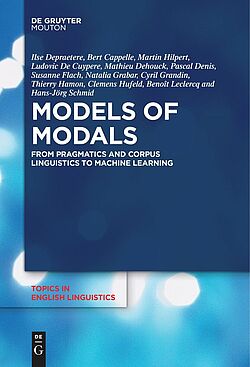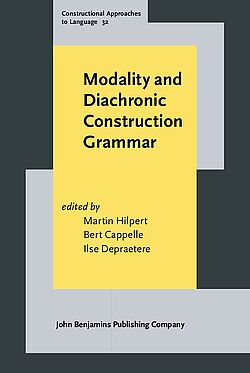
Bert Cappelle
- FACULTE DES LANGUES, CULTURE ET SOCIETES
Home
Hi!
I'm a professor of English linguistics. As a scientist, I enjoy observing how we use words in context. In line with Usage-based Cognitive Construction Grammar, I defend the view that much of our linguistic knowledge is exemplar-based. This means that our grammar is constructed piecemeal, in a bottom-up way. From the concrete utterances we are being exposed to as speakers, we gradually detect recurring sequences and extract more abstract patterns. Schematic templates (constructions in the traditional sense) and several of the lexical sequences that gave rise to them thus co-exist in a single large mental storage space, which we call the 'construct-i-con'.
You can follow my research on ResearchGate or on Academia, where there are links to the full texts of most of my publications.
I have explored various research questions over the years; the Research areas page offers an overview.
If you are a student wondering which topics you could work on for your master's dissertation or doctoral thesis, also check the (French-language) Teaching page.
Recent books (authored, co-authored and edited)
Review of this book by Jakob Horsch in English Language and Linguistics.
Reviews of this book by Marta Carrareto in English Language and Linguistics, by Yubin Qian on SSRN, and by Ziheng Zhou and Deliang Wang in Corpus Pragmatics.
So what?
Does the work of linguists—let alone descriptive and theoretical ones—really matter?
It’s a fair question.
Today’s generative AI, built on large language models (LLMs), wasn’t developed by linguists, but primarily by engineers and computer scientists. Yet, the success of systems like ChatGPT, Claude, Gemini, etc. supports some of the more recent linguistic theories, those that emphasize emergence from data and reject inborn syntax. Indeed, the surprising capabilities of generative AI using LLMs seem to align more naturally with usage-based, probabilistic approaches, and with the interactive nature of human language learning, than with a Universal Grammar (UG) view of language. That contemporary AI chatbots can converse with such apparent ease—producing and interpreting novel utterances with complex syntax in ways that are semantically subtle and pragmatically appropriate—suggests that language knowledge can emerge from exposure, shaped by frequency and socially grounded experience, rather than from an innate module governed by rigid, explicit rules. So, some linguists were right. But they weren’t asked. And they weren’t credited.
In all honesty, much of what linguists do is, first and foremost, of interest to linguists themselves, focused as some of them are on developing adequate theories of how words are integrated into constructions, how constructions are linked to other constructions, and what constructions are, in the first place. These are, admittedly, rather academic concerns, and, apart perhaps for in the domain of language teaching, we don’t know with certainty whether there will ever be practical applications for any of the theoretical insights we are formulating.
However, there are times when linguists are explicitly called upon as experts to help settle matters that have relevance beyond university campuses. I myself had the opportunity recently to provide expertise in an international arbitration case, alongside four other linguists, on the precise meaning of words in a sentence from a bilateral investment treaty, whose interpretation seemed open to some debate. Investment disputes between states and companies can have high financial stakes, running into the hundreds of millions of dollars—sometimes reaching over ten billion dollars. When it comes to states expropriating property without fair (or any) compensation, linguists can thus contribute in a valuable way by ensuring that legal agreements are interpreted with precision. Once any real or apparent ambiguities are cleared up, these agreements can be properly enforced, which can contribute to fostering a fairer and more just society.
But it’s true that we don’t save lives directly.
Or do we?
Take gun violence. In the United States alone, more than 10,000 people are murdered with firearms every year. Whenever gun violence in the U.S. is protested, pro-gun groups invoke the Second Amendment, which protects “the right of the people to keep and bear arms.” However, using standard techniques from corpus linguistics, it can be argued that the Framers of the Constitution most likely intended this to refer to the collective right to serve in militias, rather than to an individual’s right to own guns. This is just one example of how an analysis of how words and phrases are ordinarily used in their (historical) context may have a life-or-death impact.
The same holds true in diplomacy, where the stakes are often much higher. An inadequate word or phrase can absolve international organizations from exercising their moral duties. For instance, when organizations stop short of calling mass atrocities genocide and instead use the phrase acts of genocide, they create the illusion of a lesser crime, despite the fact that, linguistically, acts of genocide should mean nothing less than genocide and thus constitute crimes against humanity—in the same way that acts of vandalism are simply vandalism and hence punishable misdemeanors. Thus, linguists might not only help ensure that communication remains appropriately vague and non-confrontational but also, in other cases, expose hedged formulations as veiling a starker reality. And sometimes, it’s up to linguists to call a lie a lie.
Linguistics may not often take center stage in public discourse, but its relevance runs deeper than many realize. So, does the work of linguists really matter? The evidence speaks for itself. Linguistics, also when theoretical or descriptive in nature, can save time and save money, and could sometimes even save lives.






